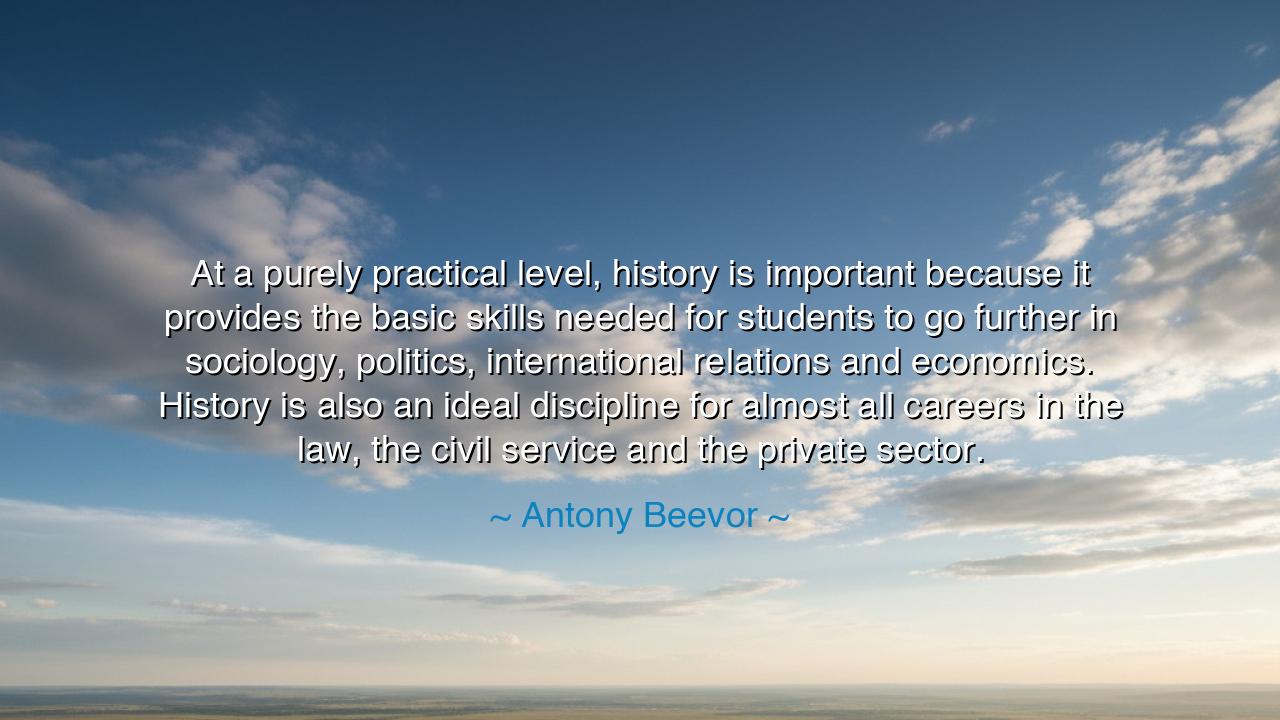
At a purely practical level, history is important because it
At a purely practical level, history is important because it provides the basic skills needed for students to go further in sociology, politics, international relations and economics. History is also an ideal discipline for almost all careers in the law, the civil service and the private sector.






"At a purely practical level, history is important because it provides the basic skills needed for students to go further in sociology, politics, international relations, and economics. History is also an ideal discipline for almost all careers in the law, the civil service, and the private sector." Thus declared Antony Beevor, the chronicler of wars, who has spent his life unveiling the lessons of the past. His words remind us that history is not a dead relic, but a living foundation, equipping the mind to discern, to reason, and to judge rightly in the affairs of men.
The ancients themselves honored history as a fountain of wisdom. Thucydides did not merely record battles but sought to teach how power rises and falls, how men err and how they endure. Cicero named history the "teacher of life," for through it, one gains foresight in politics, caution in law, and understanding in governance. The skills honed in studying the struggles of the past are the very same skills needed to guide the fate of nations in the present.
Consider the shaping of America’s founders. They steeped themselves in the histories of Greece and Rome, learning from the rise of republics and the fall of tyrants. From these lessons in history, they crafted the Constitution, blending liberty with order. Without the discipline of the past, their wisdom in politics and law would have been thin, and the republic might never have endured.
So too in the 20th century, leaders who understood history were those best able to navigate peril. Winston Churchill, steeped in the chronicles of empires, recognized the threat of Nazi Germany when others were blinded. His knowledge of past aggressors in international relations gave him the foresight to resist appeasement. Here is proof of Beevor’s truth: that history shapes the mind to meet the present with courage.
Therefore, let this be passed down: despise not the study of history, for it is the forge where judgment, prudence, and vision are tempered. In every field—whether sociology or economics, civil service or private trade—the one who knows the past walks with a lantern through the dark, while the ignorant stumble blindly. To study history is not to gaze backward, but to prepare the soul for all the battles yet to come.






QQuan
I agree with Beevor that history can offer crucial skills for future careers, but I’m curious about how these skills differ in their application. For example, how does the study of history equip someone in law compared to someone pursuing a career in private business? Are the skills learned from history universally applicable, or are there distinctions in how they’re used across various professions?
KHLy Huynh Khanh Ha
It’s interesting how Beevor ties history to such diverse areas like sociology, economics, and even international relations. It raises a question: does history serve as a foundation for understanding these subjects, or does it limit our view by being too focused on past events? What role should history play in the study of contemporary issues, where we often need innovative, forward-thinking approaches? I’d love to hear more on that perspective.
GDGold D.dragon
Beevor’s point about history being useful in law and civil service makes a lot of sense. After all, understanding past legal systems or political conflicts can shape better decision-making today. However, I wonder if the traditional study of history is enough to prepare students for these careers, or if more practical, modern methods of learning need to be integrated? How much does history teaching evolve to match the current world’s demands?
TTCao Thi Tien
I get the sense that Beevor is saying that history is more than just facts and dates; it's about developing skills that can apply to many different fields. But, I wonder if this emphasis on practical use in fields like economics or international relations might underplay the value of history as an end in itself. Can studying history simply for the sake of understanding the past hold as much merit as it does in these practical contexts?